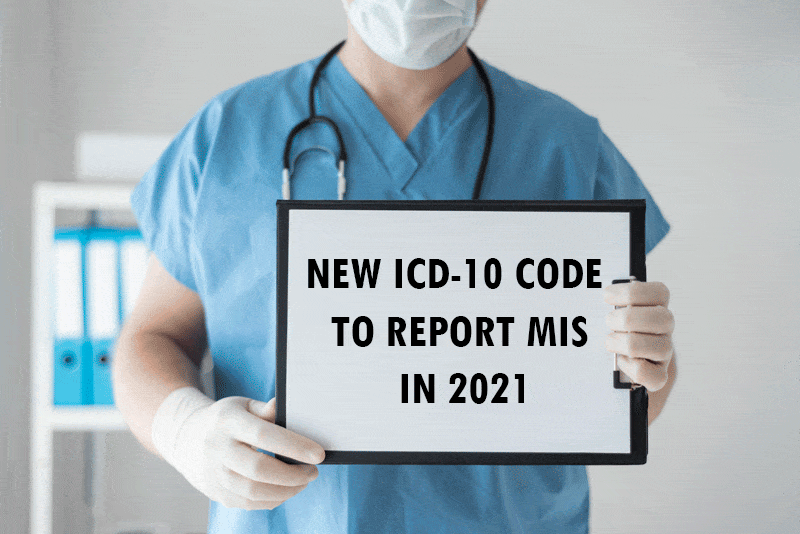Multisystem Inflammatory Syndrome (MIS) is a complex, serious condition that is associated with COVID-19 in both children and adults. In 2021, there is new ICD-10 code for this condition – M35.81. As new information emerges regarding COVID-19, providers need to be meticulously following coding and billing guidance and regulations from the CDC, AMA, and other official organizations. Reporting COVID-19-related conditions on health care claims is much easier with the help of an experienced medical coding and billing company. Accurate COVID-19 coding and billing can help providers get paid for services provided to patients presenting with symptoms of COVID-19.
Nationally, more than 1,200 cases of MIS and 23 deaths have been confirmed across 44 states, according to an ABC12 report published first week of January. Multisystem inflammatory syndrome in children is referred to as MIS-C and the adult version is called MIS-A.
Symptoms
The CDC describes MIS-C as a condition where “different body parts can become inflamed, including the heart, lungs, kidneys, brain, skin, eyes, or gastrointestinal organs”. MIS-C symptoms may include fever, abdominal pain, vomiting, diarrhea, neck pain, rash, bloodshot eyes, or feeling extra tired.
As not much is known about MIS-C causes and risk factors, the condition is considered a syndrome – a group of signs and symptoms According to the CDC, cases met five criteria:
- a severe illness requiring hospitalization in a person aged ≥21 years;
- severe dysfunction of one or more extrapulmonary organ systems (e.g., hypotension or shock, cardiac dysfunction, arterial or venous thrombosis or thromboembolism, or acute liver injury)
- laboratory evidence of severe inflammation
- Fever ≥24 hours
- a positive test result for current or previous SARS-CoV-2 infection (nucleic acid, antigen, or antibody) during admission or in the previous 12 weeks, or exposure to person with COVID-19 within the 4 weeks prior to the onset of symptoms
New ICD-10 Code for MIS
The new ICD-10 code for MIS (M35.81) includes “code first”, “code also”, and “use additional code” guidance:
M35.81 – Multisystem inflammatory syndrome
The American Academy of Pediatrics (AAP) provides the following guidance to report MIS:
- For individuals with MIS and COVID-19, assign code U07.1, COVID-19, as the principal/first-listed diagnosis and assign code M35.81 as an additional diagnosis.
- If MIS develops as a result of a previous COVID-19 infection, assign codes M35.81 and B94.8, Sequelae of other specified infectious and parasitic diseases.
- If an individual with a history of COVID-19 develops MIS and the provider does not indicate that MIS is due to the previous COVID-19 infection, assign codes M35.81 and Z86.16, Personal history of COVID-19.
- If an individual with a known or suspected exposure to COVID-19 and no current COVID-19 infection or history of COVID-19 develops MIS, assign codes M35.81 and Z20.822, Contact with and (suspected) exposure to COVID-19.
- Assign additional codes for any associated complications of MIS.Examples of codes for associated complications of MIS (as listed in www.findacode.com):
- acute hepatic failure (K72.0-)
- acute kidney failure (N17.-)
- acute myocarditis (140.-)
- acute respiratory distress syndrome (J80)
- cardiac arrhythmia (147-149.-)
- pneumonia due to COVID 19 (J12.82)
- severe sepsis (R65.2-)
- viral cardiomyopathy (B33.24)
- viral pericarditis (B33.23)
Treatment
Hospitalization is required to treat MIS-C, with some patients needing treatment in a pediatric intensive care unit. Treatment usually involves supportive care and measures to reduce inflammation in affected organs and prevent permanent damage.
Supportive care may include: fluids for dehydration, oxygen to address breathing issues, ventilator, blood pressure medications, medications that reduce the risk of blood clots, and rarely, the use of extracorporeal membrane oxygenation (ECMO). Other types of care include treatment to reduce swelling and inflammation may include antibiotics, steroid therapy, intravenous immunoglobulin (IVIG), and therapies aimed at reducing high levels of cytokines or proteins which can cause inflammation.
The type and severity of symptoms and which organs and other parts of the body are affected by inflammation would determine the type of treatment given to the patient.
Many new ICD-10-PCS codes became effective on January 1, 2021. Thorough, detailed documentation will pave the way for accurate coding and appropriate and timely claims payments for hospitals and physicians. Outsourced medical billing services can reduce physicians’ workloads as they focus on providing care.




